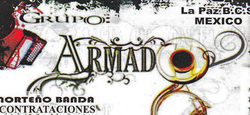
I order an Indio, one of the few Mexican dark beers generally available and contemplate the bay. A mariachi band comes in to take a look at the crowd. They are late middle-aged men who nonetheless look far younger than their battered instruments. The bass in particular looks like it has been tossed carelessly into the cargo hold of every bus in North America, its wooden surfaces scarred at every seam.
The old guys look at the crowd. Besides myself, there is only a family gathered at one table and a pair of young guys at another. Mariachis like couples or large parties for their audiences. There are none here, and the band departs without offering their services or playing a note.
I order, camerones la diabla con queso, shrimp in hot cheese sauce. A second mariachi band stops outside, finishing their cigarettes out of respect for el Dorado's non-smoking policy, before marching up the steps to survey the crowd. This band has four members. Two play accordions, one a tuba and one merely sings. Both the tuba and the soloist are unusual for a mariachi band. The men are much younger and they are here to work. They launch into song despite the unpromising audience.
The accordions are fairly new but the tuba appears to have been on the same bus tour as the bass. The tuba player looks older than the rest of the band, but maybe that's just because he is bulkier, a fleshy counterweight to his instrument. I have never been this close to a tuba player in the act of tuba-playing, and I find it interesting. Playing the tuba looks like hard work. His cheeks puff and he bounces rhythmically. His eyes bulge with the effort, and he is just producing a series of similar notes, the equivalent of a bass line. He is the only band member sweating when the song ends.
Another Mexican working hard at a thankless job, like all of the immigrant housepainters, landscapers and tomato pickers that have tiptoed across the border to the United States to take jobs away from all the Americans who want to mow lawns, paint houses or pick tomatoes for a career. Then it strikes me: THE TUBA PLAYERS ARE NEXT! PRETTY SOON, THERE WON'T BE A MARCHING BAND WITHOUT A MEXICAN TUBA PLAYER IN THE UNITED STATES! THAT'S WHY WE NEED TO BUILD THAT WALL!
Puffing harder and working cheaper, willing to sneak across the trackless deserts of Arizona, risking death by heat stroke or dehydration and carrying some pretty weighty instruments besides, Mexican tubanistas are bound to drive American-born tuba players out of the trade. Our kids will end up as flautists or piccolo players while the sound of Spanish tuba fills the land. Playing tuba, like finishing cement or hot tar roofing, will soon be an impossible dream for American youth.
The band finishes and passes out cards. They are a norteno band, the cards say. Some norteno music is said to glorify the leaders of Mexican drug cartels. Another reason to ban the tuba player! Unlike American popular music, which often glamorizes criminals and crime, norteno music glamorizes criminals and crime in Spanish, a language most of us don't understand. Obviously, that makes it worse.
The camarones a la diabla arrive, twenty or so medium fresh shrimp accompanied by Spanish rice and roasted vegetables with baby potatoes. As I eat, the sun gets lower and the ships in the bay seem to slowly settle back to the surface of the water. The meal and three Indios run about eighteen dollars American, including tip. I recommend the place, if you get down to La Paz before the Mexicans get wise and build a wall of their own.
 RSS Feed
RSS Feed











